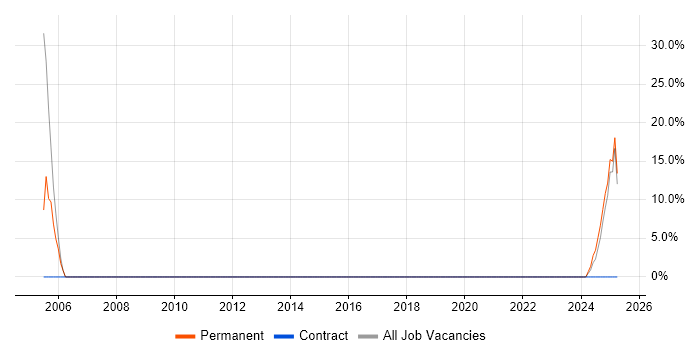Validation
Lincolnshire > Spalding
The table below provides summary statistics for permanent job vacancies advertised in Spalding requiring Validation skills. It includes a benchmarking guide to the annual salaries offered in vacancies that cited Validation over the 6 months leading up to 11 May 2025, comparing them to the same period in the previous two years.
| 6 months to 11 May 2025 |
Same period 2024 | Same period 2023 | |
|---|---|---|---|
| Rank | 1 | - | - |
| Rank change year-on-year | - | - | - |
| Permanent jobs citing Validation | 3 | 0 | 0 |
| As % of all permanent jobs advertised in Spalding | 50.00% | - | - |
| As % of the Processes & Methodologies category | 60.00% | - | - |
| Number of salaries quoted | 1 | 0 | 0 |
| 10th Percentile | - | - | - |
| 25th Percentile | £47,500 | - | - |
| Median annual salary (50th Percentile) | £50,000 | - | - |
| 75th Percentile | £52,500 | - | - |
| 90th Percentile | - | - | - |
| Lincolnshire median annual salary | £50,000 | £42,500 | £70,000 |
| % change year-on-year | +17.65% | -39.29% | +53.85% |
All Process and Methodology Skills
Spalding
Validation falls under the Processes and Methodologies category. For comparison with the information above, the following table provides summary statistics for all permanent job vacancies requiring process or methodology skills in Spalding.
| Permanent vacancies with a requirement for process or methodology skills | 5 | 33 | 25 |
| As % of all permanent jobs advertised in Spalding | 83.33% | 70.21% | 100.00% |
| Number of salaries quoted | 2 | 30 | 15 |
| 10th Percentile | £28,375 | £34,834 | £40,000 |
| 25th Percentile | £31,563 | £46,250 | £48,000 |
| Median annual salary (50th Percentile) | £38,750 | £50,000 | £50,000 |
| Median % change year-on-year | -22.50% | - | +36.99% |
| 75th Percentile | £46,563 | £56,250 | £60,000 |
| 90th Percentile | £50,125 | £57,500 | £70,000 |
| Lincolnshire median annual salary | £40,101 | £40,000 | £47,500 |
| % change year-on-year | +0.25% | -15.79% | -12.04% |
Validation
Job Vacancy Trend in Spalding
Job postings citing Validation as a proportion of all IT jobs advertised in Spalding.

Validation
Co-occurring Skills and Capabilities in Spalding by Category
The follow tables expand on the table above by listing co-occurrences grouped by category. The same employment type, locality and period is covered with up to 20 co-occurrences shown in each of the following categories:
